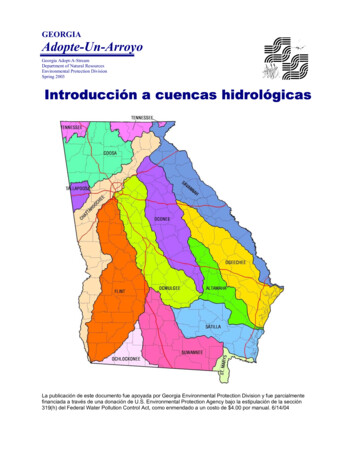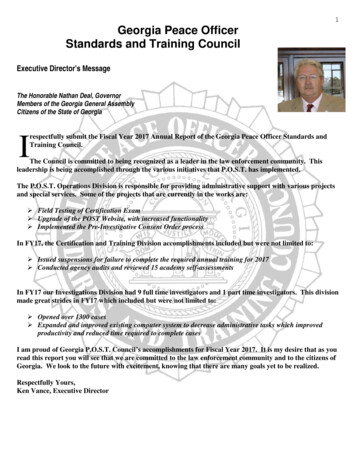
Transcription
1Georgia Peace OfficerStandards and Training CouncilExecutive Director’s MessageThe Honorable Nathan Deal, GovernorMembers of the Georgia General AssemblyCitizens of the State of GeorgiaIrespectfully submit the Fiscal Year 2017 Annual Report of the Georgia Peace Officer Standards andTraining Council.The Council is committed to being recognized as a leader in the law enforcement community. Thisleadership is being accomplished through the various initiatives that P.O.S.T. has implemented.The P.O.S.T. Operations Division is responsible for providing administrative support with various projectsand special services. Some of the projects that are currently in the works are: Field Testing of Certification Exam Upgrade of the POST Website, with increased functionality Implemented the Pre-Investigative Consent Order processIn FY17, the Certification and Training Division accomplishments included but were not limited to: Issued suspensions for failure to complete the required annual training for 2017 Conducted agency audits and reviewed 15 academy self-assessmentsIn FY17 our Investigations Division had 9 full time investigators and 1 part time investigators. This divisionmade great strides in FY17 which included but were not limited to: Opened over 1300 cases Expanded and improved existing computer system to decrease administrative tasks which improvedproductivity and reduced time required to complete casesI am proud of Georgia P.O.S.T. Council’s accomplishments for Fiscal Year 2017. It is my desire that as youread this report you will see that we are committed to the law enforcement community and to the citizens ofGeorgia. We look to the future with excitement, knowing that there are many goals yet to be realized.Respectfully Yours,Ken Vance, Executive Director
2MISSIONIt is the mission of the Georgia PeaceOfficer Standards and TrainingCouncil (P.O.S.T.) to provide thecitizens of Georgia with qualified,professionally trained, ethical andcompetent peace officer and criminaljustice professionals.The Georgia P.O.S.T. Counciladministers the regulatory process, setsthe standards for training andcertification, and provides essentialtechnical assistance to the lawVISIONP.O.S.T. envisions a professionally trained and ethicalcriminal justice profession. This is accomplished by: Establishing and implementing high standards, developing andfacilitating contemporary training curricula and programs. Holding criminal justice professionals to a higher standard. Providing the citizens of Georgia with the best protection in thenation.
3Georgia P.O.S.T. CouncilThe composition of the Council, its power, and function is establishedin Title 35 Chapter 8 of the Official Code of Georgia, Annotated. TheCouncil consists of nineteen voting members and is supported by anadvisory board. The voting members include:Sheriff Mike Yeager, ChairmanA Peace OfficerChief John King, Vice-ChairmanChief of PoliceSheriff Mike Jolley- SecretaryA County SheriffMayor Linda BlechingerA City Manager or MayorCommissioner Tom McMichaelA County CommissionerDirector Chris BarnettChairman of the State Board of Pardons and Paroles ofGA. or DesigneeCommissioner Lamar ParisAssociation County Commissioners of Ga. orDesigneeLt. Steve HymanA Municipal Police Officerother than a Chief of PoliceSgt. Dolly JohnsonA Municipal Police OfficerOther than a Chief of PoliceMayor Billy TrapnellPresident of the Georgia Municipal AssociationOr DesigneeAsst. Director Dan KirkDirector of the Georgia Bureau of Investigationor DesigneeDon BanksMember other than the Attorney GeneralChief Billy GroganPresident of the Georgia Association ofChiefs of PoliceWarden Chris HillPresident of the Georgia Prison Wardens'AssociationSheriff Terry DeesePresident of the Georgia Sheriffs' AssociationMajor Stephen AdamsPresident of the Peace Officers Associationof GeorgiaCommissioner Michael NailThe Commissioner of Georgia Dept. of CommunitySupervisionTimothy WardThe Commissioner of Correctionsor DesigneeLt. Col. Russell PowellThe Commissioner of the Department ofPublic SafetyCommissioner Walter RabonDepartment of Natural ResourcesMarshal Steve SmithA Peace OfficerDirector Scott CagleDepartment of Juvenile Justice or Designee3
4Georgia P.O.S.T. Council Advisory MembersThe advisory members are appointed by the Council Chairman, and itis their responsibility to serve in an advisory capacity and represent across section of the criminal justice system. The advisory membersare:Director Chris WiggintonState OfficerGeorgia Public Safety Training CenterExecutive Director Frank V. RotondoAssociation DirectorGeorgia Association of Chiefs of PoliceExecutive Vice President Terry NorrisAssociation DirectorGeorgia Sheriffs' AssociationDirector Bruce HomesBoard of RegentsAsst. Director Nicholas Marinelli, Jr.GA. Perimeter College Campus PoliceLt. Barry WoodwardCommunications DivisionChief Wayne DennardAcworth Police DepartmentDirector Robert BoltonGeorgia Internal Affairs Investigators AssociationDean Tom BojoTechnical College SystemGA. Northwestern Technical CollegeMajor Alan EveridgeLaw Enforecement Officer
Georgia Peace Officer Standards and Training CouncilSheriff Mike Yeager, ChairmanChief John King, Vice-ChairmanSheriff Mike Jolley, SecretaryTraining StandardsCommittee:Probable CauseCommittee:Executive Committee:Certification Committee:Stephen Adams, ChairmanDan Kirk, Vice-ChairmanRussell PowellChris BarnettChris HillWalter RabonMichael Nail, ChairmanDolly Johnson, ViceChairmanMike YeagerJohn KingMike JolleyTim WardLinda BlechingerSteve SmithMike Yeager, ChairmanJohn King, Vice-ChairmanMike Jolley, SecretaryMichael Nail, PCCStephen Adams, TrainingStds.Tom McMichael, Cert.Tom McMichael, ChairmanSteve Hyman, Vice-ChairmanTerry DeeseBilly GroganLamar ParisBilly TrapnellDon BanksScott CagleAdvisory Members:Chris WiggintonTerry NorrisBarry WoodwardTom BojoWayne DennardBruce HolmesRobert BoltonAdvisory Members:Frank RotondoNicholas Marinelli, Jr.Alan Everidge
6Georgia P.O.S.T. Council StaffExecutive DirectorThe Council’s rules and policies are executed by a professional and clerical staff, whichoperates under the supervision of the Executive Director. The Executive Director isresponsible for planning, organizing and directing the administration of a statewideprogram involving over 60,000 officers actively employed by over 1100 agencies. Appointed by Governor Sonny Perdue as Executive Director of the Georgia Peace OfficerStandards and Training Council, August 15, 2007 - Present Georgia College & State University, Director of Public Safety/University Police Chief,October 1, 1982 – August 15, 2007 City of Milledgeville- Councilman, 1981 - Present Baldwin County Board of Education, High School English Teacher, 1980-1985 Baldwin County Sheriff’s Department, Deputy Sheriff, 1976-1982 Monroe Police Department, Peace Officer, 1975-1976 Peace Officer Standards & Training Council-Executive Board- Chairman & Vice-Chairman:Probable Cause Committee-Chairman State of Georgia Municipal Training Institute-Chairman, 8 years State of Georgia E-911 Board Georgia Municipal Association Board of Directors University of Arkansas, Master of Fine Arts Georgia College, Bachelor of Arts Young Harris College, Associate of Arts Degree
7Georgia P.O.S.T. CouncilExecutive DirectorKen VanceBudget ManagerNeeNah YarbroughExecutive AssistantMeghan FailNeal LewisIT ManagerDavid NettlesProgrammerDirector of P.O.S.T.InvestigationsPhillip StacyDirector of P.O.S.T. Training& CertificationsJeff MillerDenise HudsonAdministrativeAssistantRenee ShawAdministrativeHearingsJulie LewandowskiMike BowmanLois MitchellCertificationsSpecialistLiz ChadellCertificationsSpecialistCarl EllisLeevan KirkDoug FlemingLeevan KirkTommy KeheleyPam RittewegerPart TimeInvestigatorDiane GaddisCertificationsSpecialistGena AdamsCertificationsSpecialistZetta LoweryCertificationsSpecialistMelanie MonkCertificationsSpecialistPaula SparksSteve GoodyearDirector of P.O.S.T.OperationsRyan PowellSharon JonesAuditor PositionLara HollisterOperationsAnalystJill PerryRecordsCustodian
8PurposeThe purpose of the Georgia P.O.S.T. Council is to ensure that onlyqualified and well-trained persons are certified as peace officers in this state.In order to attain the goals, the Council has been given the statutory authorityto enforce those qualifications and training requirements enumerated by lawsto: Research, plan, and establish policy relative to peace officer training Develop, adopt, and issue advanced or professional peace officer certificates based on education,training, and experience Determine whether a peace officer candidate has met legal pre-employment and training requirements Refuse to grant a certificate or to discipline certified peace offices and exempt officers who have notmet or have failed to maintain the minimal standards of acceptable and prevailing practices of peaceofficers Provide technical assistance as requested by law enforcement units Provide and administer the certification of persons qualified to operate speed detection devices andwithdraw and suspend such certifications Establish minimum qualifications for school directors and certify those qualified Certify instructors and withdraw or suspend such certifications Establish and modify the curriculum, including methods of instruction, composing the basic course Evaluate schools annually for recertification Withdraw or suspend certification of schools or school directors who fail to continue to meet ormaintain, at any given time, the criteria and qualifications required Enforce those qualifications and training requirements enumerated by laws Ensure standards are maintained by peace officers Take corrective action against officers who violate standards Develop and adopt quality training for all peace officersThe staff of the Georgia P.O.S.T. Council consists of the Executive Office and 3 divisions: Certification and Training Standards Division Investigations Division P.O.S.T. Operations
9Certification and Training Standards DivisionThe primary function of the Certification and Training Standards Division is to ensurecompliance, by agencies and peace officers, of qualifications and training requirementsenumerated in the P.O.S.T. Act. Some major responsibilities include: Process applications for peace officer certificationDivision Reports: Agency rosters Issue of basic certification Certify speed detection device operators Demographicreports Provide technical assistance to agencies Processing of specialty certifications General and Specialty Instructors Certification Individualpersonnel andtraining histories Agency deficiencyreports Seminar ApprovalCertification of Peace OfficersAll employees of any agency that are granted the full rights and powers under the definition of a peaceofficer as defined by the P.O.S.T. Act must be certified by P.O.S.T.Peace officer applicants must complete ALL certification requirements before employment. Once the preemployment requirements are met, an authorization for training is issued.Certifications issued by the Council include:BASIC CERTIFICATIONSBasic Law EnforcementGBI InvestigatorSheriffCommunications OfficerNarcotics AgentCorrectional OfficerProbation OfficerParole OfficerJail OfficerForensic Scientist (GBI only)Basic Juvenile CorrectionalOfficer Municipal Probation Officer Communication Officer SPECIALTY CERTIFICATIONSRadarLaserVascarField Training OfficerIdentification TechnicianDepartmental Training OfficerGeneral & Specialty InstructorsCareer Development CertificationsArson InvestigatorBomb TechnicianHandler of Animal Trained to DetectExplosives Senior and Master Instructor Trainer Recognition of Law Enforcement AgenciesAll agencies covered by the P.O.S.T. Act or those permitted to voluntarily comply with the Act can be recognizedby P.O.S.T. Those requesting recognition must submit to P.O.S.T. a copy of the ordinance or law thatestablished their authority as a law enforcement agency, along with a request for recognition from appointingauthority. Once approved, the agency is supplied with an identification number and all paperwork necessary toconduct business with P.O.S.T.
10
11Georgia P.O.S.T. CouncilCertification & Training Standards DivisionJeff MillerDivision DirectorMelanie ficationGena AdamsCertificationSpecialistJail ionProcess 20-hourTraining WaiversDiane icerF.T.O/I.D. TechD.T.O. & ArsonCertificationGeneralized,Guest ntCertificationLois MitchellCertificationSpecialistZetta LoweryCertificatinSpecialistPeace OfficerCertificationPeace OfficerCertificationSheriff and GBICertificationProcess EOTApplicationsArchive RecordsLiaisonMedicalDisabilitySuspensionLiz icationSharon JonesAuditorAuditAcademies andAgenciesEnters TrainingAttend AcademyAdvisory BoardMeetingsConducted POSToverview courses
12PEACE OFFICER STATISTICSBASIC CERTIFICATIONSPeace OfficerJuvenile Probation OfficerJail OfficerCommunication OfficerJuvenile Correctional OfficerState Correctional OfficerParole & Probation OfficerTOTAL BASICEXEMPT REGISTRATIONSPeace Officer(Retired)Federal OfficerTOTAL BASIC EXEMPTSPECIALTY CERTIFICATIONSArson InvestigatorField Training OfficerRadar OperatorInstructorLatent Print ExaminerLaser OperatorSheriffTraffic Accident ReconstructionCAREER ntExecutiveSenior Instructor TrainerMaster Instructor TrainerSenior DeputyDepartmental Training OfficerBomb Techs. & Animal HandlerJail Training OfficerComm. Training OfficerCrime Scene TechTOTAL SPECIALTY CERTIFICATIONSTOTAL ALL 59612110200453,99410,661
13Training Standards DivisionThe Training Standards Division is responsible for the functions related to development, evaluation andmanagement of peace officer training. Other major responsibilities include: Curriculum development, modification and maintenanceResearch and developmentPerforming quality control functions on basic and advanced-level trainingProcessing of school, school director, and functions relating to instructorcertification Out-of-State course equivalency ratings for approval/disapproval Technical assistance to 28 POST certified police academies Processing and evaluating new course recognition requestsSpecial Operations of the Training Standards DivisionThe Training Standards Division has additional responsibilities that ensure the peace officers of Georgiaare receiving the highest quality and most up to date training that is available. These responsibilitiesinclude, but are not limited to: Process and review Basic Course Completion packages (300 ) to ensurecompliance with POST rules and policy Process and review peace officers’ requests for waiver of the 20 hourannual training requirement Re-certification Application Processing
14Georgia Peace 2%Local AgenciesTotal 61,575State Agencies
15Peace Officer Populationby Government 210,0004405,000-StateCountyMunicipalMis. OthersJudicial
16Employed by SPMiscGCSDNRGBI
17Investigations DivisionThe Georgia Peace Officer Standards and Training Council has discretionary authority by law,to discipline officers. Disciplinary action is taken in the form of sanctions against an officer’scertification. Action is based on the preponderance of evidence that they were in violation of theP.O.S.T. Act (O.C.G.A. §35-8 as amended).Discipline/Investigation of OfficersThis division is responsible for investigating terminations of officers, suspensions of more than30 days, and alleged criminal involvement of any officer. The investigator then reports to theP.O.S.T. Council Probable Cause Committee (PCC) for further action/recommendation. ThePCC recommends a sanction to the Council, which may include: (a) Revocation ofCertification; (b) Suspension of Certification; (c) Probation; or (d) Sanctions as permitted byLaw, (O.C.G.A. 35-8-7.1(11)). During FY 2017 there were over 100 felony arrest/indictmentsuspension orders issued.Technical AssistanceThe investigation division also provides technical assistance to the law enforcement agenciesand their officers in matters relating to the P.O.S.T. Act.
18 19GEORGIA PEACE OFFICERSTANDARDS AND TRAININGCOUNCILInvestigations Division1. Allegationof Misconductis Reported toP.O.S.T.2. InvestigationsDirectordeterminesapplicability toO.C.G.A. 35-8-7.13. Case isassignedto P.O.S.T.Investigator6. COUNCILDETERMINESSANCTION5. ProbableCauseCommitteeRecommendationPresented to FullCouncil4. CaseInvestigated andPresented toProbable CauseCommittee7. Officer is Notifiedvia Certified Mail ofthe CouncilSanction and his orher right to contestthe action throughthe Hearing Process
19HearingsOfficers are entitled to challenge sanctions imposed on their certification bythe Georgia Peace Officer Standards and Training Council. The officer’s dueprocess is afforded through and administrative hearing in accordance with theGeorgia Administrative Procedures Act (O.C.G.A. §50-13).It is estimated that over 15% of the officers sanctioned by the Councilappeal within the allotted fifteen (15) day period by filing a written request for ahearing. Once received, a “pre-hearing conference” is scheduled with the affectedofficer, the officer’s legal representative, and a member of the Attorney General’sOffice. During a pre-hearing conference, a negotiated settlement is explored. TheAttorney General makes a recommendation as to whether to proceed to a formalhearing or suggest an alternative.Unsettled cases are forwarded to the Office of State Administrative Hearings(O.S.A.H.). A Special Assistant Administrative Law Judge is assigned by the ChiefJudge of O.S.A.H. to preside in a contested case and schedules a completeevidentiary hearing in the disputed matter. Upon conclusion, the Judge willrender a “Final Decision” (conclusion is the same as Council’s action) or an“Initial Decision” (conclusion differs from Council’s action). Initial Decisions arereviewed by the Georgia Peace Officer Standards and Training Council through a“Final Agency Review”. Officers may appeal all decisions in Superior Court as amatter of law. During Fiscal year 2017 there were 130 pre-hearing conferencesheld.
20GEORGIA PEACE OFFICERSTANDARDS AND TRAINING COUNCILAdministrative HearingsCASE ISFORWARDED FORA PRE-HEARINGCONFERENCE TOBE SCHEDULEDFILE DUPLICATED& FORWARDED TOATTORNEYGENERAL'S OFFICEOFFICER IS NOTIFIEDVIA CERTIFIED MAILOF SANCTIONIMPOSED BY P.O.S.T.COUNCILOFFICERCHALLENGESSANCTION / REQUESTHEARINGPREHEARINGCONFERENCEA.G. / RESPONDENT/AND P.O.S.T.A.L.J. DECISION ISSAME AS COUNCILFINAL ACTIONA.L.J. DECISION ISDIFFERENT THAN COUNCILFINAL AGENCY REVIEWOFFICER MAY APPEAL A.L.J.DECISION OR AGENCY DECISION INSUPERIOR COURTSETTLEMENTREACHED /APPROVED BYCHAIRMANPROCEED TOFULL HEARINGOFFICE OF STATEADMINISTRATIVEHEARINGSCONDUCTSHEARING
21P.O.S.T. Operations DivisionThe P.O.S.T. Operations Division is responsible for providing administrative support andspecial services. Other major responsibilities include: Certification Examination Custodian of Records- Open Records Request Curriculum Revision Special Projects Media Relations Rule Revisions Technology Support for Headquarters & FieldOfficers Administrative Hearings Pre-Investigative Consent OrdersDuring FY 2017 P.O.S.T. responded to approximately 6,693 Open Records Requests. This Division istasked with searching for and implementing new processes that will make the agency more efficient.Maintenance of P.O.S.T. Computer System/Peace Officer RecordsP.O.S.T.’s Data Communications Section maintains the following records on the P.O.S.T. computersystem:A.B.C.D.E.F.Personnel HistoryEmployment HistoryDisciplineTraining CoursesChief ExecutivesSheriffs’; Wardens’; and Chiefs’Current Training HistoriesG. Training Course CompletionsH. Certification/RegistrationI. TerminationsJ. AgenciesK. Advanced CertificationP.O.S.T. maintains employment, certification and training records on over 115,000 officers. Of these,over 61,000 are actively employed in their field of certification.
22HearingsOfficers are entitled to challenge sanctions imposed on their certification bythe Georgia Peace Officer Standards and Training Council. The officer’s dueprocess is afforded through and administrative hearing in accordance with theGeorgia Administrative Procedures Act (O.C.G.A. §50-13).It is estimated that over 15% of the officers sanctioned by the Councilappeal within the allotted fifteen (15) day period by filing a written request for ahearing. Once received, a “pre-hearing conference” is scheduled with the affectedofficer, the officer’s legal representative, and a member of the Attorney General’sOffice. During a pre-hearing conference, a negotiated settlement is explored. TheAttorney General makes a recommendation as to whether to proceed to a formalhearing or suggest an alternative.Unsettled cases are forwarded to the Office of State Administrative Hearings(O.S.A.H.). A Special Assistant Administrative Law Judge is assigned by the ChiefJudge of O.S.A.H. to preside in a contested case and schedules a completeevidentiary hearing in the disputed matter. Upon conclusion, the Judge willrender a “Final Decision” (conclusion is the same as Council’s action) or an“Initial Decision” (conclusion differs from Council’s action). Initial Decisions arereviewed by the Georgia Peace Officer Standards and Training Council through a“Final Agency Review”. Officers may appeal all decisions in Superior Court as amatter of law. During Fiscal year 2017 there were 130 pre-hearing conferencesheld.
23PRE-INVESTIGATIVE CONSENT ORDERSThe Pre-Investigative Consent Order (commonly referred to as PICO) Program was designed tohelp alleviate the Investigation Division with backlog cases and reduce their case load as a resultof the implementation of the POST Data Gateway. The PICO program allows certainapplicants/candidates and certified officers to resolve a POST disciplinary issue in an expedientmanner with use of consent orders for certain violations similar to plea agreements in certaincriminal cases.Although POST Council approved POST RULE Chapter 464-7 entitled Pre-InvestigativeConsent Orders in December 2015, the rule became effective on Jan. 10, 2016. The processbecame available to Applicants and Certified Officers after March 9, 2016 POST CouncilMeeting.According to POST Rule Chapter 464-7, Pre-investigative consent agreements may be enteredinto by Georgia POST Council and an applicant/candidate for certification or person certifiedpursuant to O.C.G.A. Title 35, Chapter 8. POST Council may issue a pre-investigative consentorder in situations in which the individual agrees to the imposition of certain disciplinarysanctions in accordance with O.C.G.A. Title 35, Chapter 8, Section 7.1. Entering into a consentagreement resulting in a consent order is entirely voluntary and any person entering into suchagreement waives all other proceedings, hearings and processes normally associated with actionstaken by POST Council.In certain instances, using guidelines approved by the POST Council, a pre-investigative consentorder may be offered, in lieu of a full POST disciplinary investigation. Any such consent orderagreed upon and finalized by the Executive Director and Chairman shall be presented before theCouncil at the next regularly scheduled meeting for final approval. In cases in which noagreement is made, the Director of the Investigations Division of the Council shall assign thecase to an investigator as in other cases.A pre-investigative consent order may be rescinded by the Council if it is found to have beenbased on misleading, deceptive, untrue, or fraudulent information or documents submitted toPOST Council or its staff. If a pre-investigative consent order is rescinded, the investigativematter shall be forwarded to the POST Investigations Division for review by the Council.The Administrative Hearing Officer oversees the Pre-Investigative Consent Orders after caseassignment from the Director of Investigations Division.Since June 2016, POST Council has approved 127 Pre-Investigative Consent Orders.
Field Testing of Certification Exam . Juvenile Peace Officer Correction Officer . Medical Disability Suspension. Career Development Certification . Process 20-hour Training Waivers F.T.O/I.D. Tech. . Juvenile Correctional Officer 669; 508 575; 509 559; 1.

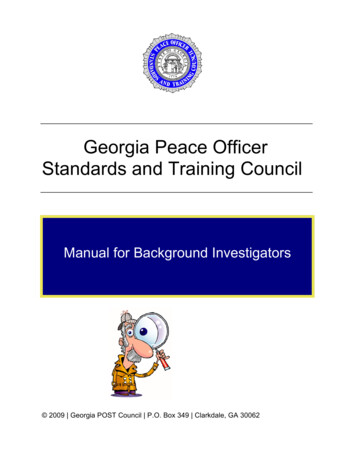
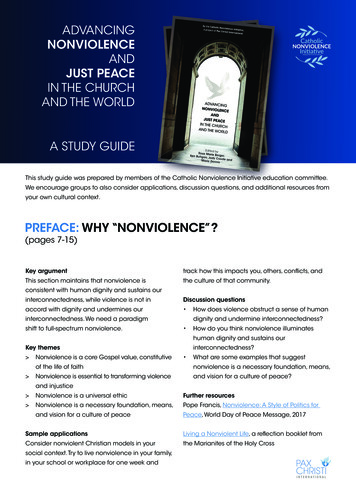



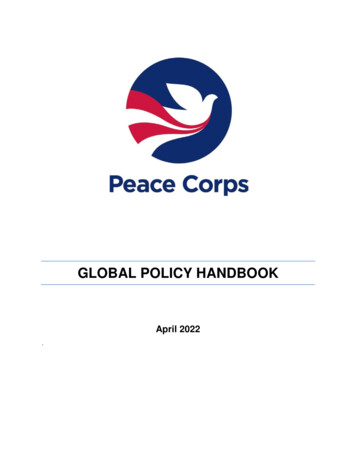
![3184 PPT [Read-Only] - Texas Municipal Courts Education Center](/img/38/00-collins-binder-law-update.jpg)

